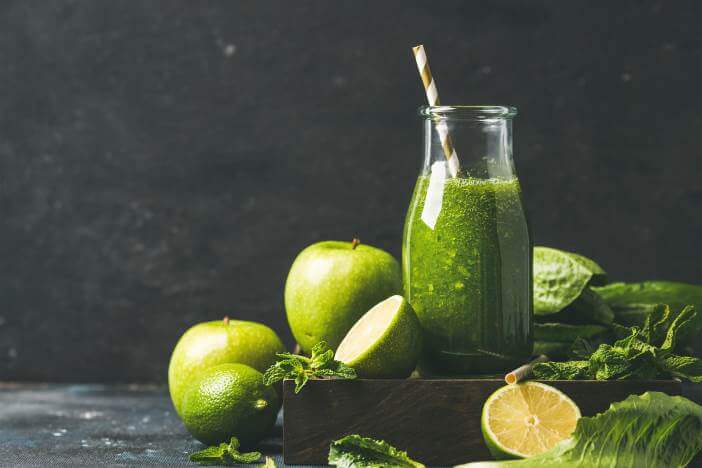Detox diet

Detox diet: what is it and how does it work?
In contrast to most other diets, the detox diet is not meant to be used for weight loss, but rather for detoxifying the body and mind. The Principle is similar to that of therapeutic fasting: you avoid “toxic” food and other influences that are stressful for the body and mind. Primarily fruits and vegetables are allowed on a detox diet— generally in a liquefied form. Also, water intake is increased. Often, the detox diet is started with natural laxatives to clear out the bowels movement using natural aids. There is no fixed minimum length of time that the detox diet should last, but by no means should it last longer than two weeks.
What is and isn't allowed on the detox diet?
| Allowed | REDUCED / ALLOWED IN SMALL AMOUNTS |
|---|---|
| Water and tea | Solid food (except fruit and vegetables) |
| Fruit | Nicotine |
| Vegetables | Alcohol |
Who is the detox diet suitable for?
- This type of diet is suitable in its normal form for any healthy person.
- People with metabolic disorders, mental disorders, or a high level of stress should not go on a detox diet.
- In addition, the detox diet should not be carried out for more than two weeks at a time in order to prevent deficiency symptoms.
Advantages and disadvantages of the detox diet
| Advantages | Disadvantages |
|---|---|
| The body is detoxified and the intestine is cleansed. | The extreme food restriction can cause withdrawal symptoms. |
| The lack of food results in rapid weight loss. | In addition, the detox diet requires high levels of discipline and endurance. |
| The detox diet is primarily intended for cleansing and not for weight loss. |
Detox diet in detail
How individual is the detox diet?
- Similar to fasting, the rules are general and the same for everyone. Since only liquid foods and raw fruits and vegetables are allowed, there is no great need for individual adaptation.
- This form of the diet can be combined with almost all special eating habits since it consists mainly of fruit and vegetables.
How flexible is the detox diet?
- Because the detox diet requires people to abstain from eating almost all solid food (except fruits and vegetables), it is stressful for the body. For busy people with busy schedules, this diet may not be very suitable.
- There is no food preparation or cooking required on the detox diet, which is appealing to many people. Although eating out or visiting a restaurant is pretty much out of the question—so social gatherings could be a big challenge.
- Usually, special products such as teas or juices are offered or required. Some of these are only available online and may be expensive.
- The detox diet must, therefore, be carefully planned in advance so that it can be carried out stress-free.
How suitable is the detox diet for everyday use?
- The body is less resilient during fasting so professional duties can be a challenge—particularly during the first three days of fasting.
- Fasting is also difficult with a social life (e.g. at parties, restaurants) because there may be tempting food available that tests your discipline.
- The cost of food is reduced to a minimum here. Time is also saved because there is no need to cook or buy much food.
How scientific is the detox diet?
- The theory behind the detox diet is that it purifies the body. Not only“bad”, unhealthy food and stress affect our bodies, but also various chemical residues. These are said to accumulate in our bodies from the polluted environment. By avoiding “heavy” foods, the body becomes freed of these waste materials and cleansed.
- However, the chemical residue myth also has its opponents: Many Scientists believe that the kidneys and liver detoxify harmful substances in the body on their own. Additional detox agents make no difference.
- That being said, detox phases are not harmful to health. Similar to fasting, they can be used as an introduction to a long-term change in diet. The short-term abandonment of”heavy” and”stressful” food can be a relief for the body and can help the metabolism to stabilize again after a short acclimatization period.
- However, this diet should not last longer than two weeks, since it can lead to deficiency symptoms. The detox diet can also pose major health risks.
How sustainable is the detox diet and what are the risks?
- Socially, the detox diet is only suitable for everyday use to a limited extent, since food options are severely restricted and the body often needs more rest (as it is less resilient during the detox phase).
- Also, the purpose of the detox diet is to avoid typical stressful everyday influences such as traffic smog, digital devices, stress, and noise.
- The detox diet is only of limited use as a weight loss diet because it is not about a permanent change in diet, but is rather a short phase.
- As with other extreme diet forms, the yo-yo effect is common after completing the detox diet (i.e. the weight lost during the diet is regained in a short time).
Summary and evaluation
People’s opinions about detox diets are mixed. A short phase of food restriction poses no major health risks and can help to detoxify the body and mind. However, following a detox diet long-term is not possible. And many health claims surrounding detox products are also questionable. With that being said, a drastic change such as detox or fasting phase can be a good transition to a sustainable diet change. However, we would like to reiterate here that the main purpose of a detox diet is to detoxify and cleanse the body—not for weight loss. Our overall rating, therefore, looks like this:
| Criteria | Rating |
|---|---|
| Customizability | ◆◇◇◇◇ |
| Flexibility | ◆◆◈◇◇ |
| Suitability for everyday use & feasibility | ◆◆◇◇◇ |
| Scientific basis | ◆◆◆◇◇ |
| Sustainability | ◆◆◇◇◇ |
| TOTAL VALUATION | ◆◆◈◇◇ |
Detox diet vs. Upfit
| Criteria | Detox diet | Upfit |
|---|---|---|
| Customizability | ◆◇◇◇◇ | ◆◆◆◆◆ |
| Similar to fasting, the rules are general and the same to everyone. Since only liquid foods and raw fruits and vegetables are allowed, there is no great need for individual adaptation. | Adapted to your goal, taking into account allergies and intolerances and eating habits. Optional adjustments to your personal diet, such as vegetarian, vegan, pescetarian, flexitarian or paleo. Features such as "meal swapping" and "favorite meals" individualize the plan. | |
| Flexibility | ◆◆◈◇◇ | ◆◆◆◆◇ |
| The detox diet requires people to abstain from eating almost all solid foods (except fruits and vegetables), it is stressful for the body. For busy people with busy schedules, this diet may not be very suitable. However, there is no food preparation or cooking required on the detox diet, which is appealing to many people. | Your meals are predetermined. The meal swapping feature and information provided in advance enable adaptation to personal everyday life. The meals can be skipped when you eat out or visit restaurants. | |
| Suitability for everyday use & feasibility | ◆◆◇◇◇ | ◆◆◆◆◈ |
| The body has limited resilience during fasting. In the first three days in particular professional duties can be a challenge. Fasting is also difficult with a social life(e.g. at parties, restaurant visits). | Suitable for everyday use, thanks to short cooking times and consideration of your food budget. For busy people and professionals, no cooking at lunchtime is necessary: choose your cooking schedule and/or use the time-saving meal prep option to prepare meals ahead. | |
| Scientific basis | ◆◆◆◇◇ | ◆◆◆◆◆ |
| The theory behind the detox diet is that it purifies the body. Not only “bad”, unhealthy food and stress affect our bodies, but also various chemical residues. These are said to accumulate in our bodies from the polluted environment. By avoiding "heavy" foods, the body becomes freed of these waste materials and cleansed. While claims are questionable, detox phases are not harmful to health. | Scientifically-based meals and snacks in the right portion size for your personal nutrient and vitamin needs, based on a low-carbohydrate nutritional principle developed in cooperation with sports experts and nutritionists. | |
| Sustainability | ◆◆◇◇◇ | ◆◆◆◆◆ |
| The detox diet is only of limited use as a weight loss diet because it is not about a permanent change in diet, but is rather a short phase. As with other extreme diet forms, the yo-yo effect is common after completing the detox diet (i.e. the weight lost during the diet is regained in a short time). | Scientifically-based meals and snacks in the right portion size to meet your personal nutritional and vitamin needs lead to healthy, long-term weight loss. The diet can also be carried out for an indefinite period of time. | |
| Total | Detox diet | Upfit |
| ◆◆◈◇◇ | ◆◆◆◆◆ |



